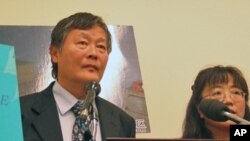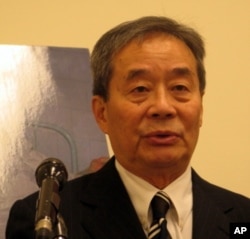Advocates for human rights in China joined members of the U.S. Congress on Monday in denouncing the recent detention of a Chinese lawyer who testified before a congressional human rights committee earlier this month. Critics say the detention of Jiang Tianyong underscores the dangers of weakening U.S. pressure on China regarding human rights.
Jiang was detained last week after returning to Beijing from visiting the United States, where he testified before the Tom Lantos Human Rights Commission in the House of Representatives.
According to his account given to the group Human Rights in China - Jiang telephoned the U.S embassy on November 18th to ask that he and other human rights defenders be permitted to meet with President Barack Obama.
Jiang was briefly detained at the embassy and taken home by Chinese police. On November 19, Jiang says at least four policemen confronted him in front of his apartment building as he was leaving to take his seven-year-old daughter to school.
His wife was pushed to the ground after attempting to intervene, and her cell phone was confiscated. Jiang was taken to a district police station and interrogated for more than 13 hours before being released.
Republican Representative Chris Smith, who is among the sharpest congressional critics China's human rights record, questioned whether President Obama was aware of the attempt by Jiang and other defense lawyers to meet with him.
"Did President Obama even know or care that several leading dissidents were rounded up, harassed, punched, beaten, threatened and detained immediately prior to, during and after the president's visit, while others languish in Lao Gai [China's criminal justice system] concentration camps," said Congresssman Smith. "Did the president know or care that they suffered precisely because of his visit?"
In translated remarks, Wei Jinsheng, an activist for human rights in China and a former political prisoner, asserted that while President Obama was correct in seeking to highlight common interests with China, he erred in not pressing Chinese leaders harder on human rights.
"According to our dealings with the Chinese communists in the past, for decades, they cannot even cash [follow through with] what they promise in public," said Wei Jinsheng. "So not to mention anything in private, it will never be cashed."
Human rights activist Harry Wu said President Obama began his visit to China "on the right foot" by raising the issue of freedom of expression and religion, but that Mr. Obama did not go far enough.
"In order to truly gain a round in the area of human rights, the U.S. must stop de-coupling human rights from the [strategic] dialogue," said Harry Wu.
Among his activities in China, Jiang has been legal counsel to Chen Guangcheng, an activist imprisoned for his opposition to China's one-child policy.
Reggie Littlejohn, who heads the organization Women's Rights Without Frontiers, said that after his testimony to a congressional hearing this month, Jiang voiced concern about the safety of his wife and daughter.
"It is very easy for an American to get up here and say things about the one-child policy," said Reggie Littlejohn. "And those of us who have the freedom to speak out must speak out. We have the absolute moral obligation to speak out because we can do so with safety. [But] people like Jiang Tianyong are risking their lives and the lives of their families to break the news to the West."
Michael Horowitz, Director of the Projects for Civil Justice Reform and International Religious Liberty at the Hudson Institute, said American presidents must be willing to take strong stands when they visit foreign countries.
"He [Mr. Obama] should have bargained harder," said Michael Horowitz. "[For example], the point we have all made, to insist as a condition of his trip, that he be able to speak on national Chinese television as other presidents who were not naïve insisted on as a price of the visit."
Jenny McCloy is Director of Advocacy for China AID, a Christian organization that is pressing for more religious freedom in China.
"We hope the rule of law can be upheld in at least the protection of the lawyers who are the very persons promoting it," said Jenny McCloy.
Congressman Smith told reporters that he and other lawmakers have not received specific information from the U.S. embassy in Beijing regarding what steps officials might take to follow up on Jiang's 13-hour detention.
Smith says that detentions of activists such as Jiang who testify to congressional panels will not have an impact on similar appearances in the future, adding that such hearings take place only with the full knowledge of witnesses about what the consequences for them might be.






